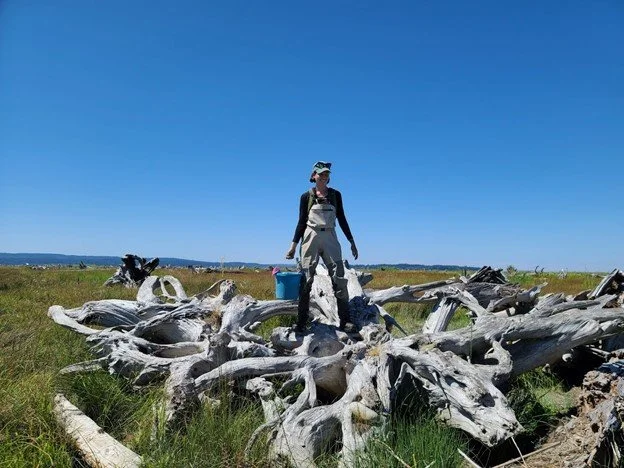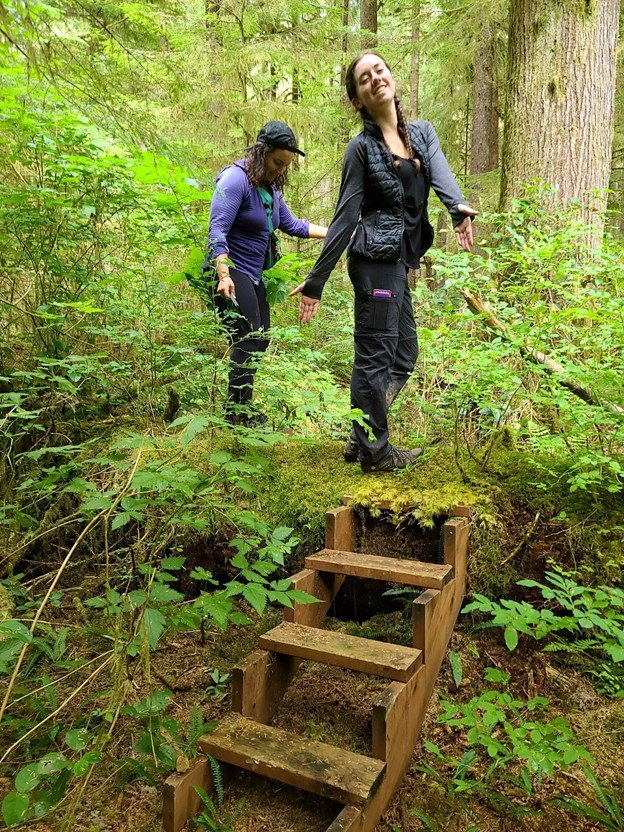Two students from The University of Washington completed science internships with The Nature Conservancy over the summer. Stephanie Schmid and Eileen Arata worked with us on several projects including Ellsworth Creek Preserve camera trap and tree reproduction research projects, an eastern forests literature review, Greening Research in Tacoma, and Port Susan Bay Preserve restoration.
Join us as both Eileen and Stephanie share their experiences this summer in the field!
Eileen Arata and Maia Murphy-Williams hike off trail at Ellsworth Creek Preserve. Credit: Stephanie Schmid.
Eileen Arata and Maia Murphy-Williams navigate the terrain at Ellsworth. Credit: Stephanie Schmid.
Q: What is something totally new and awesome you experienced during your internship?
A: Eileen Arata
Before this summer, I had not had much field experience, so every day in the field brought something new. Taking on narrow elk trails in the Ellsworth Creek Preserve was an adventure I won’t soon forget. I had never been off trail hiking before, and it was amazing to look back on camera photos that we collected to see what animals were wandering around just a day or two before I was at the same spot. Another favorite and completely new task was conducting science in waders. It took no small amount of skill to keep from getting stuck in marsh mud while handling measuring instruments. There really is no other place I could get so many varied and awesome experiences in one summer.
A: Stephanie Schmid
This summer I was fortunate enough to witness the TNC Science Team working hard on impactful research projects that inform conservation management decisions in a variety of different ecosystems and places. It was exciting to see conservation in action and the work, care and collaboration that goes into it. I was also able to gain valuable field experience and learn new skills. I hiked very steep and rough terrain in Ellsworth Creek Preserve in order to collect wildlife camera footage, helped identify and measure vegetation and salinity in the marsh at Port Susan Bay Preserve, helped identify and sort seeds in the lab, helped collected temperature data in Tacoma and wrote a literature review on belowground carbon dynamics. The experience offered such a variety of new and awesome experiences!
Eileen Arata helps install temperature loggers that sense air temperature in Tacoma as part of Greening Research in Tacoma. Credit: Stephanie Schmid.
Stephanie Schmid stands on driftwood at Port Susan Bay Preserve for a day of restoration work. Credit: Molly Bogeberg/TNC.
Q: Can you share a story from the field this summer?
A: Eileen Arata
After we finished up our last day of fieldwork in the Ellsworth Creek Preserve, Steph and I were lucky enough to get a mini tour of the old growth area. The “path” that went through that area was certainly superior to the narrow game trails and slopes we had been hiking on for the wildlife cameras, but it was still overgrown in places and required climbing over fallen trees. Until… we found a very beautifully constructed staircase to help us get over a fallen tree. We couldn’t help laughing at how random it looked in the middle of the woods. After all the bushwhacking and root-tripping over the past two days, we really enjoyed the random, tiny boost to finish off the trip.
A: Stephanie Schmid
During the summer we got into some pretty hairy, overgrown areas in Ellsworth Creek Preserve in order to retrieve the wildlife camera data. At one point a huge pile of woody debris gave out from under me and I was dangling from one leg on a dead tree branch, like a little kid on monkey bars. It was tough to get out because I was laughing pretty hard but also because I was stuck… Field work is fun! I found it rewarding to push myself physically in the field, gain new skills and appreciated the chance to get to know Ellsworth, a really special landscape where active restoration is being done to accelerate the forest toward old growth forest structure and function.
Stephanie Schmid, Eileen Arata, and Maia Murphy-Williams take a break from installing a wildlife camera at Ellsworth Creek Preserve. Credit: Stephanie Schmid.
Eileen Arata and Stephanie Schmid touring the central Cascades Forest. Credit: Michael Case/TNC.
Q: What is a challenge you overcame?
A: Eileen Arata
My biggest challenge was trying to stay focused while we were sorting seeds for a study on tree productivity in Ellsworth. As I’ve found with scientific projects I’ve been a part of, even the most interesting research can have some rough moments, and searching for tiny seeds from a pile of forest debris was certainly one of them. Steph and I eventually found a good rhythm of podcasts and conversation, which just goes to show how science is always better with someone else around. I’m excited to see the results of the project, but I may not go looking for seeds in the woods any time soon.
A: Stephanie Schmid
A challenge I overcame was trying to narrow down a topic to focus on during the literature review. TNC’s The Climate Resilient Forests and Communities team has outlined many interesting and important research questions related to co-benefits of restoration activities, climate change impacts, and forest health. There are so many interesting papers out there that I had a really hard time choosing what to focus on and dig deeper into. Ultimately, I decided to tackle the topic of belowground carbon. The TNC questions I chose to focus on were (1) Can large-scale restoration increase carbon stability under projected climate and wildfire regimes? (2) How does harvesting affect soil carbon? Globally, soils store more carbon than the atmosphere and all vegetation combined so it seemed like an important body of research to acquaint myself with.
Stephanie Schmid bushwacking in Ellsworth Creek Preserve. Credit: Samantha Michelsen.
Field work at Port Susan Bay Preserve. Credit: Molly Bogeberg/TNC.
Q: What was your favorite part of helping the Science Team with their research?
A: Eileen Arata
The best part about helping the Science Team was by far getting to know all its members. Everyone was extremely welcoming and helpful at every turn, whether we worked with them directly or not. They took the time to explain their projects and get me excited about realms of environmental science that I didn’t even know existed before. If I had to get more specific than just the entire summer, I would say the wildlife study in Ellsworth was my favorite project to help with. This was my first time doing a wildlife study from camera collecting, photo tagging, all the way through to data analysis. It gave me unmatched experience to do wildlife research in the future. Speaking of unmatched experiences, I would like to specifically mention our direct supervisors, Ailene Ettinger, Michael Case, and Maia Murphy-Williams for making this summer so educational and memorable. I look forward to seeing all of the Science Team’s future projects aid in the conservation of Washington State.
A: Stephanie Schmid
The Washington TNC Science Team is truly a wealth of knowledge and every opportunity I had to benefit from that was truly appreciated. My favorite part of helping the Science Team was getting to help with so many different research projects in one summer. This experience has really helped me to find my footing in my new career in ecology. As an untraditional undergraduate / post-baccalaureate student who moved into science from a career in the art world, I’ve felt at times I was playing catch up and I was behind in some way. This experience has eased some of those anxieties and has given me a better idea of what research I’m interested in pursuing, what skills I will need moving forward in ecology and what to expect as a working research scientist. I would like to thank Ailene Ettinger, Michael Case, and Maia Murphy-Williams for their mentorship and guidance this summer. This summer internship with TNC has been so enriching. I am forever grateful!

No responses yet